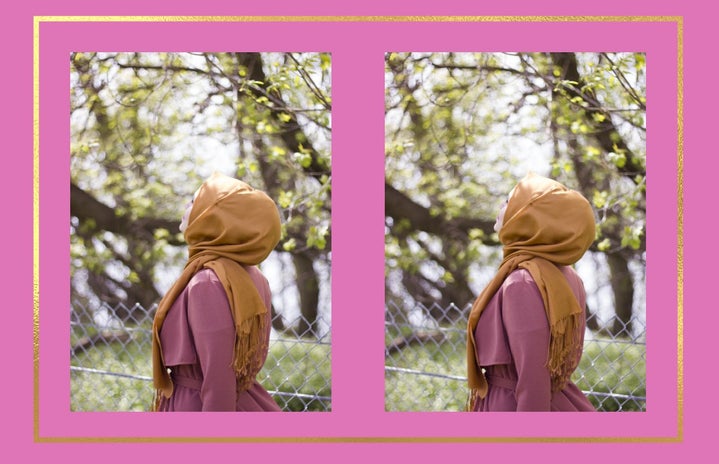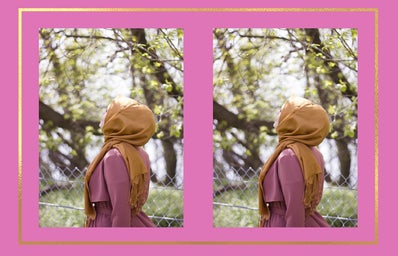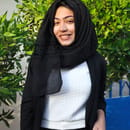In all my conversations throughout the years with many young, Muslim women, who choose not to identify as a feminist, I’ve noticed they all have something in common. Their justifications all fluctuate around two major things: 1. that the current portrayal of feminism is not one that aligns with their religious beliefs, and 2. that Islam and feminism are mutually exclusive, and by aligning yourself with one, you are automatically required to denounce the other. In this article, I will be illustrating how, in today’s society, being Muslim and feminist is not only feasible but exceedingly important.
One of the most central and vital aspects that arise when discussing why many women of colour choose to not identify as feminists, is the concept of white feminism, which is also coincidentally the type of feminism predominantly shown in the media. According to an article written on Chacruna, this doctrine, built and amplified by white women, claims to speak for all women while ignoring the needs of women of colour and suppressing their voices. This racist ideology is another extremely valid reason why many women of colour choose not to identify with mainstream feminism. Mainstream feminism has been overtaken by the needs and desires of white women and consistently suppresses the same groups of women on which the entirety of the movement was built on. It is an undeniable fact that many WOC, especially Black women, are only granted a seat at the table for the facade of inclusivity, rather than because their voices add value and perspective. The reason many people are turned away from feminism is that they see it at face value, rather than a deeper look into it. Feminism does not have to be what is seen in the media, with organizations such as the Women’s March; a great idea in theory, but another example of how White Feminism misses the needs of other disempowered WOC. This ideology has clouded the true fight from many WOC activists who have been struggling their entire lives for an ounce of the representation that affluent, middle class, white women already have.
When analyzing this, we must understand, as a collective, that being under or misrepresented in the media by conformist feminism is not a reason to deny or negate the movement as a whole. Too often, I have been placed in conversations where another Muslim hijabi justifies her reasoning by relating it to misrepresentation and the unalignment of values. While I recognize the validity of the statement, continuing to distance ourselves from such a social and historical movement only further radicalizes the religion. The critique of white feminism and being a POC feminist can and should co-exist to further propel the movement in the right direction, as the preexisting dominance of white women in the online world will lead to further misrepresentation of Muslims and other women of colour.
Now, the question arises, why should anyone support a movement such as feminism when it has been overtaken by the agendas and priorities of white women while ignoring the needs of WOC?
As mentioned by Harper’s Bazaar, we can use the history of this movement as a teaching lesson. Which is, if there is no intersectionality in feminism, then it is simply a more polished version of white supremacy. Going up against liberal-progressive white feminists is undoubtedly the hardest, draining, and exhausting (both mentally and physically) part of being an active feminist, in an effort to have your voices and needs on par with those who already get the most attention.
By declaring ourselves feminists and making an inclusive space for ourselves will we be able to spread the knowledge that there are bigger issues in the world. At its core, feminism was about education, bodily autonomy, reproductive rights. Instead of clouding these issues, we must bring this awareness to other parts of the world. We must recognize our privilege in being able to advocate for certain rights, when women in other parts of the world, such as South Asia and the Middle East, may not have access to education or basic necessities. In our mission for feminism and equality, at the center should be the drive to level the playing field for women, not only WOC in developed countries but underdeveloped ones as well.
Overall, the critique of white, mainstream feminism is not a reason as to why we can deny calling ourselves a feminist. In it’s truest practice, feminism and Islam have many, many theories in agreement. Cultures around the world have enacted a cruel and twisted narrative of Islam as a harsh and violent religion, in their teachings and behaviourisms with women. The key to identifying that the culture is the problem, and not the religion, is the implementation of truly Islamic Feminism, which “draws on the Quranic concept of equality of all human beings, and insists on the application of this theology to everyday life”. There are many streams of feminism, such as intersectional, Black feminism, which allows Black women to be able to resonate with their experiences concerning sexism, racism, and class. Similarly, instead of taking feminism as what is presented to us in the media, we can dive further into the study of what it truly means, and proudly declare ourselves Muslim feminists, who not only have intersectional values but the desire to teach the Quranic concept of equality to cultures who have a history of the mistreatment of women.
Personally, I have constantly been battling with this journey myself of whether it is Islamically appropriate to be Muslim and feminist, and I’ve been back and forth for years, and I will undoubtedly continue to question myself as I move forward. However, where I’ve come to now, after doing major introspection and evaluating where I want my life and values to lie, I can firmly say that being feminist and Muslim is not the issue, it’s what kind of feminism we choose to practice and portray.


